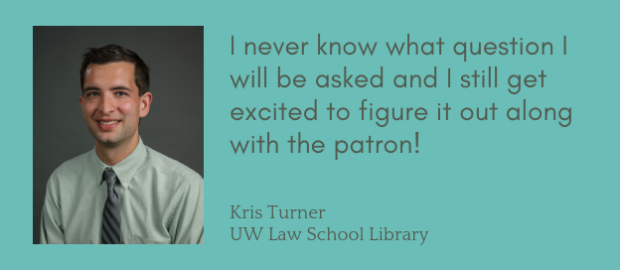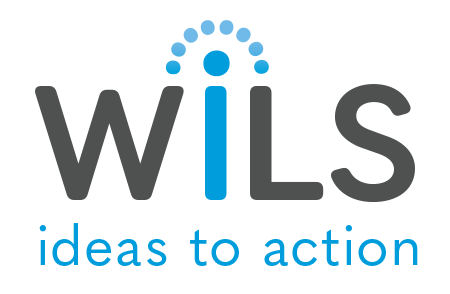
One of our greatest joys at WiLS is hearing our members tell the stories of the big and important work they are doing – interesting new projects or initiatives, or even interesting and new approaches to old projects. And, in addition to hearing about it, it makes us even happier when we can share those stories with other members. Each month, WiLS is proud to feature an interview with one of our library members.
This month, we interview Kris Turner, Assistant Director of Public Services at the UW Law School Library.
Why did you, personally, choose to work in libraries?
I came to the library world in a strange way. When I moved to Madison, I had planned on resuming my stalled teaching career. I had applied for several teaching positions and a temporary certificate for substitute teaching. While I was on the job hunt, I got a job I meant to be temporary as a “Page II” at the Meadowridge branch of the Madison Public Library. I truly loved it more than I thought I could. I was able to use many of my teaching skills with more than just students – I was able to help adults with numerous questions as well. That desire to help people is why I eventually went to Library School. In my current position, I am able to assist a diverse set of patrons – students, faculty, the general public, and even attorneys and judges. I really enjoy the unknown quantity of working with the public: I never know what question I will be asked and I still get excited to figure it out along with the patron!
What is unique about the culture of your library? How do you influence it?
The Law Library occupies a unique position on the UW-Madison campus. We are often known as the “quietest” library on campus, a designation that the law students will often help us enforce. Since we serve the law community, we are now in the process of being “aggressively helpful” – conducting more outreach to people who may not know we are a resource for them. This includes attorneys across the state, pro se (non-lawyer) patrons at public libraries, and students who may not be aware of the level of assistance we can provide via subscribed and free tools. As a member of the Public Services staff, we are consistently promoting and marketing for the library by going where the patrons are – presenting to attorneys in La Crosse, Appleton, and Fond Du Lac, talking with students during their lunch hour, and connecting with public libraries so they are aware of the services we offer.
What do you think is important to know about the community you work with? What helps you understand their needs?
Nearly all the patrons we work with are in a stressful situation. Law students are in the midst of a difficult three-year degree. Pro se patrons are involved in a court case. Attorneys are looking for quick help during a court case. When a patron asks a question, I try to understand why this is so important to them and how not having the right resource is making their life more difficult. From there, I find the quickest and most intuitive way for their question to be answered and include directions for how to locate the needed information next time. Beginning from the idea that the right answer will relieve stress puts me in the right state of mind to answer legal research questions.
What big ideas are being worked on at your library? What problems are being solved?
Two big ideas we have recently implemented are focused on solving long-standing problems of the availability of legal scholarship and resources.
First, we launched a law school institutional repository. The project was a sprawling and complicated one that took us over three years to launch. But now, we are able to provide a safe and permanent home for all the scholarly publications created by our faculty. We have worked hard to make the resources as discoverable and complete as possible. The best part is that this is a never-ending challenge. We are constantly adding new items and collections. Right now, we are working on adding a large (100,000+) collection of legal briefs to our collections so attorneys in “the real world” will be able to use them in the courtroom. The repository is also meant to honor the Wisconsin Idea by assisting everyone across the state. To that end, we are also creating a collection of Madison Equal Opportunity Decisions that are a great resource for tenants that feel landlords have wrongly evicted them. As the repository continues to grow, we hope that it will not only house the scholarly legacy of the law school but also serve as an open and free resource for anyone who needs help with their court case.
Second, one challenging aspect of legal scholarship is connecting a paper with its audience. Even once a paper is added to the repository, there must be an effort made to locate the scholars who would cite the paper or use it in the courtroom. To that end, the Law Library has started promoting new faculty scholarship via social media shoutouts, internal promotion to other faculty members and generally tracking downloads, page views, and other metrics from a variety of locations that will boost the publication. In May, library staff will record the first in a series of ongoing podcasts where a librarian will interview a faculty member with a new article out. The podcast will be made available on a new blog, in the iTunes store, and elsewhere. We hope that this will drum up interest in our faculty and their great publications.
Do you have anything else you’d like to share?
Despite having a very professional veneer, we also try to have some fun with our law student patrons. The Law Library offers tours and “Make Your Own READ Poster” sessions during orientation to help students feel more comfortable as they begin law school. Each year, we also put on a series of really fun events for National Library Week, including a free book giveaway, student sessions focused on writing better papers, a “guess the candy game,” and a trivia night with pizza and prizes. We have slowly grown our participation each year and now we have students ask us about the events each year. It’s a nice way to humanize the librarians and make it easier for students to ask us questions. These events are stealthy ways to not only relieve stress but also get students to feel comfortable asking their friendly librarians questions. By now, most of the students know our names – and know they can ask us anything!
These interviews are part of a series of interviews with both WiLS staff and members. Your feedback is appreciated. If you have any to offer on this article or suggestions for upcoming interviews, contact Andrea Coffin at acoffin@wils.org.
